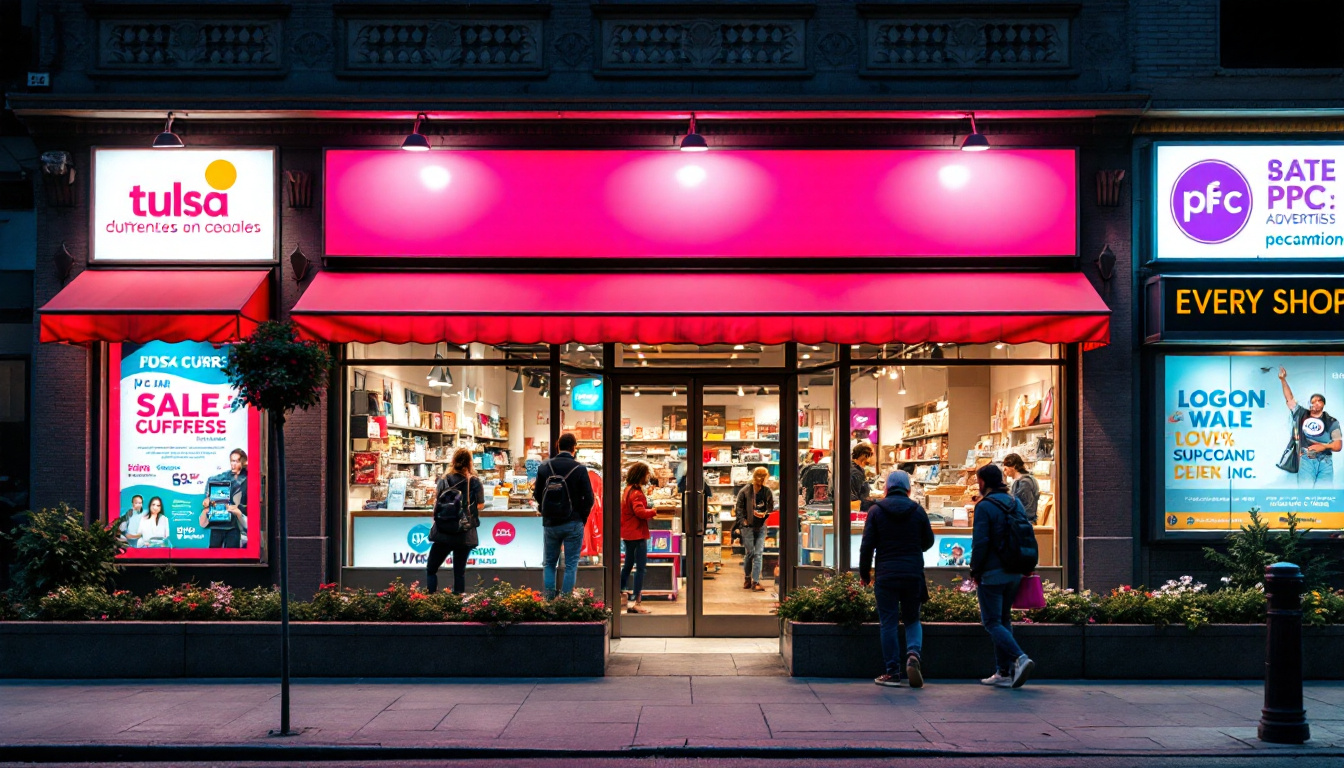The Beginner's Guide to PPC Advertising in Tulsa, OK

PPC (Pay-Per-Click) advertising is an essential marketing strategy that offers businesses a chance to target their audience efficiently. If you're a business owner in Tulsa, OK, understanding the fundamentals of PPC can greatly influence your marketing success. This guide will walk you through the basics of PPC, its advantages in the local market, steps to set up a campaign, keyword selection tips, and methods for measuring success.
What is PPC and how does it work?
PPC advertising is a model of internet marketing where advertisers pay a fee each time their ad is clicked. It essentially allows you to buy visits to your site rather than earning them organically. In the PPC model, businesses bid on keywords relevant to their products or services and create ads that will appear in search engine results when those keywords are searched.

The most common platform for PPC advertising is Google Ads. Ads are displayed at the top of search results or on websites participating in the Google Display Network. Each time a user clicks on the ad, the business pays a predetermined amount to Google, which is known as the cost-per-click (CPC).
Understanding how the auction system works is crucial for success in PPC. Factors such as bid amount, quality score, and ad relevance contribute to where your ad appears in the results. The advertisement that receives the highest rank leads to more visibility, which can result in an increased number of clicks, conversions, and overall ROI.
Another important aspect of PPC is the ability to target specific demographics and locations. Advertisers can tailor their campaigns to reach particular audiences based on factors such as age, gender, interests, and even geographic location. This level of targeting ensures that ads are shown to the most relevant users, increasing the likelihood of engagement and conversion. Additionally, PPC campaigns can be adjusted in real-time, allowing marketers to optimize their strategies based on performance metrics and user behavior.
Moreover, PPC is not limited to search engines alone; it can also be utilized on social media platforms like Facebook, Instagram, and LinkedIn. Each platform has its unique advertising features and targeting capabilities, enabling businesses to reach potential customers in various contexts. For instance, Facebook allows advertisers to create visually engaging ads that can appear in users' news feeds, while LinkedIn focuses on B2B marketing, providing opportunities to connect with professionals and decision-makers in specific industries. This versatility makes PPC a powerful tool in a marketer's arsenal, capable of driving traffic and generating leads across multiple channels.
Why PPC is ideal for businesses in Tulsa, OK
For businesses in Tulsa, PPC advertising holds significant advantages. It allows for targeted marketing, reaching potential customers who are actively searching for specific services or products. This targeted approach is particularly beneficial in a locality like Tulsa, where competitors may be minimal for niche markets. By focusing on specific keywords and demographics, businesses can tailor their ads to resonate with local consumers, enhancing the likelihood of conversion.
PPC also provides immediate results. Unlike SEO, which can take months to yield results, a well-structured PPC campaign can drive traffic to your website almost instantly. This immediacy is particularly helpful for local businesses that want to attract customers quickly, especially during peak seasons or events. For instance, a restaurant in Tulsa can launch a PPC campaign to promote a special menu during the Tulsa State Fair, ensuring that their offerings are front and center for attendees searching for dining options nearby.
Furthermore, PPC advertising is highly measurable. Business owners in Tulsa can track various metrics such as click-through rate (CTR), conversion rate, and overall expenditure. This data is crucial as it allows businesses to refine their campaigns in real time, ensuring better ROI and strategic decision-making. With tools like Google Ads, local businesses can analyze which ads perform best and adjust their strategies accordingly, maximizing their advertising budget and enhancing their visibility in the local market.
Additionally, the flexibility of PPC allows businesses to experiment with different ad formats, such as text ads, display ads, and video ads, catering to diverse audience preferences. This adaptability is particularly advantageous in a vibrant city like Tulsa, where local events and cultural happenings can influence consumer behavior. By leveraging seasonal trends and community interests, businesses can create compelling ad content that not only captures attention but also fosters a connection with potential customers.
Ultimately, PPC offers a cost-effective, measurable solution for businesses looking to grow their digital presence in a competitive market. With the right strategy, Tulsa businesses can harness the power of PPC to not only increase traffic but also build brand awareness and loyalty among local consumers.
How to set up a PPC campaign step-by-step
Setting up a PPC campaign might seem daunting, but by following these systematic steps, businesses can launch effective ad campaigns with ease.
- Define Your Goals: Before you dive into campaign creation, determine what you want to accomplish. Are you focusing on brand awareness, lead generation, or direct sales? Clear goals will guide your campaign structure.
- Keyword Research: Identify keywords relevant to your business and target audience. Utilize tools like Google Keyword Planner to find effective terms that potential customers are searching.
- Choose a PPC Platform: Google Ads is popular, but don’t overlook alternatives like Bing Ads or social media platforms like Facebook and Instagram that offer PPC services.
- Create Compelling Ads: Your ads should be eye-catching and persuasive. Include strong headlines, informative descriptions, and a clear call-to-action. Testing different ad copies can reveal what resonates best with your audience.
- Set Your Budget: Decide how much you're willing to spend on your campaign daily and monthly. Use bid settings appropriate to your business goals—manual bidding can provide more control, while automated bidding optimizes for conversions.
- Launch and Monitor: Once everything is set up, launch your campaign. It's essential to monitor its performance regularly.
By following these steps, you can create a solid foundation for your PPC campaign that aligns with your business objectives.
Additionally, consider the importance of audience targeting. Utilizing demographic, geographic, and behavioral targeting can significantly enhance the effectiveness of your ads. Platforms like Google Ads allow you to refine your audience based on factors such as age, gender, location, and even interests, ensuring that your ads reach the most relevant users. This level of targeting not only increases the likelihood of conversions but also helps in optimizing your budget by reducing wasted spend on irrelevant clicks.
Furthermore, don't underestimate the power of A/B testing in your PPC campaigns. By experimenting with different ad formats, landing pages, and audience segments, you can gather valuable data on what works best. This iterative process allows you to continuously improve your campaigns, enhancing performance over time. Regularly revisiting and adjusting your strategies based on this data can lead to better results and a higher return on investment.
Tips for choosing the right PPC keywords
Selecting the right keywords for your PPC campaign is pivotal to its success. Here are some effective tips to ensure you choose wisely:
- Think Like Your Customers: Consider the terms your potential customers would use to search for your products or services. Try to adopt their perspective.
- Long-Tail Keywords: While competitive short-tail keywords can be valuable, targeting long-tail keywords—more specific phrases with lower search volume—can provide better conversion rates.
- Analyze Competition: Look at the keywords your competitors are using. Tools like SEMrush can offer insights into competitor strategies that can help you inform your keyword choices.
- Utilize Negative Keywords: Implementing negative keywords helps filter out irrelevant traffic. This ensures that your ads are only shown to users who are likely to convert.
- Regularly Update Your Keywords: Periodically review and adjust your keywords based on performance analytics to optimize your campaigns continuously.
Choosing the right keywords is a constant process that requires attention, but it pays off by attracting the right audience to your site.
How to track and measure success in PPC
Monitoring and measuring the success of your PPC campaign is essential for understanding its effectiveness and ROI. To do this, consider the following metrics:

- Click-Through Rate (CTR): This metric indicates how often people click on your ad after viewing it. A higher CTR means your ad is compelling and relevant to your audience.
- Conversion Rate: This measures how many clicks led to desired actions, such as sales or sign-ups. Improving your conversion rate often requires tweaking landing pages or ad copy.
- Cost per Click (CPC): Understanding how much you spend on each click is vital. Keep an eye on this metric to ensure you're within your budget while maximizing your clicks.
- Quality Score: Google assigns a Quality Score based on ad relevance, click-through rate, and landing page experience. A higher Quality Score can lower your CPC and improve ad placement.
Tracking these metrics allows you to adjust your campaigns accordingly. Regular reviews enable you to capitalize on what’s working and make necessary changes to areas that are underperforming.
In conclusion, PPC advertising offers a lucrative opportunity for businesses in Tulsa, OK, to enhance their online presence. With the right strategy, keyword selection, and careful monitoring, your PPC campaigns can yield substantial results, driving traffic, revenue, and growth for your local business.

As a Google Ads expert, I bring proven expertise in optimizing advertising campaigns to maximize ROI.
I specialize in sharing advanced strategies and targeted tips to refine Google Ads campaign management.
Committed to staying ahead of the latest trends and algorithms, I ensure that my clients receive cutting-edge solutions.
My passion for digital marketing and my ability to interpret data for strategic insights enable me to offer high-level consulting that aims to exceed expectations.



















